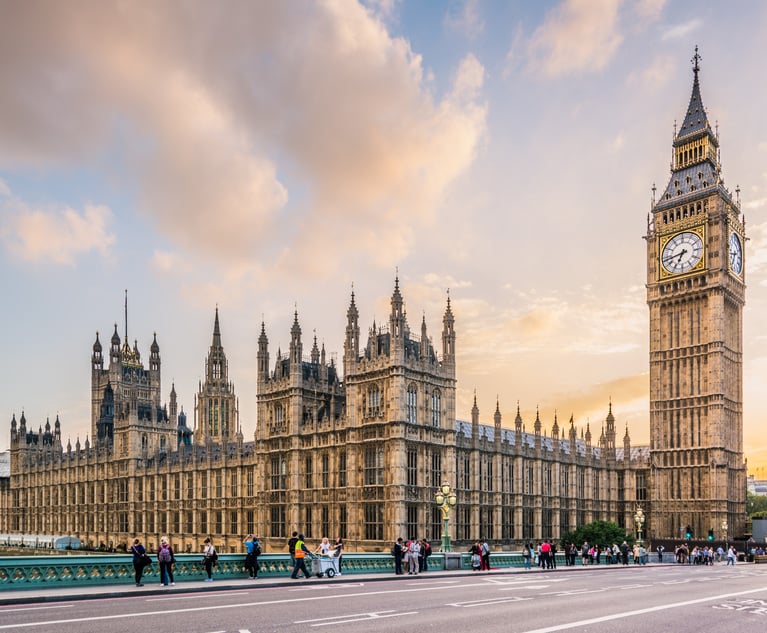Lawyers Oppose Introducing Arbitration Appeals Process, Survey Reveals
Nearly three-quarters of respondents to a survey conducted by BCLP said the time and costliness of arbitrations would make appeals more trouble than they're worth.
June 04, 2020 at 04:49 AM
2 minute read
Lawyers have said, due to the costliness and length of arbitrations, a right of appeal would make international arbitration less attractive, according to new research by Bryan Cave Leighton Paisner.
A large majority of respondents (71%) to the firm's annual arbitration survey said that when facing an international arbitration panel, they would prefer not to have a right of appeal, over concerns that this would further drag out a dispute over a longer time and cause greater expense.
The worldwide survey from 123 respondents canvassed in-house counsel, arbitrators, external lawyers, expert witnesses, academics and litigation funders.
It found that arbitration was often preferred to litigation as part of the 'bargain' struck between parties in dispute, report author George Burn, BCLP's head of international arbitration, said.
"One of the reasons why parties choose arbitration over litigation is the principle of finality—that the decision of an arbitral tribunal on the substance of the dispute cannot be appealed," he said. "Increasing the duration and cost of the arbitration process by permitting an appeal may operate to its detriment."
Burns said that 50% of respondents indicated that "they had been hit with an 'obviously wrong ruling' in the past, yet still would sign up for a no appeal process".
The preference for no right of appeal did shift if industry sectors had long-established, well-developed and widely used arbitration procedures providing or permitting appeals against an award, especially in the sports and commodities sectors, the survey said.
Read more
This content has been archived. It is available through our partners, LexisNexis® and Bloomberg Law.
To view this content, please continue to their sites.
Not a Lexis Subscriber?
Subscribe Now
Not a Bloomberg Law Subscriber?
Subscribe Now
NOT FOR REPRINT
© 2025 ALM Global, LLC, All Rights Reserved. Request academic re-use from www.copyright.com. All other uses, submit a request to [email protected]. For more information visit Asset & Logo Licensing.
You Might Like
View All
Malaysia’s Shearn Delamore Set To Expand Local Footprint With New Office Launch


CMA Uses New Competition Powers to Investigate Google Over Search Advertising

‘A Slave Drivers' Contract’: Evri Legal Director Grilled by MPs
Law Firms Mentioned
Trending Stories
- 1Nondisparagement Clauses in Divorce: Balancing Family Harmony and Free Speech
- 2Survey Finds Majority of Legal Professionals Still Intimidated by AI Despite Need to Streamline Mounting Caseloads
- 3Lessons From Five Popular Change Management Concepts: A Guide for Law Firm Leaders in 2025
- 4People in the News—Jan. 15, 2025—Ballard Spahr, Brahin Law
- 5How I Made Office Managing Partner: 'Stay Focused on Building Strong Relationships,' Says Joseph Yaffe of Skadden
Who Got The Work
J. Brugh Lower of Gibbons has entered an appearance for industrial equipment supplier Devco Corporation in a pending trademark infringement lawsuit. The suit, accusing the defendant of selling knock-off Graco products, was filed Dec. 18 in New Jersey District Court by Rivkin Radler on behalf of Graco Inc. and Graco Minnesota. The case, assigned to U.S. District Judge Zahid N. Quraishi, is 3:24-cv-11294, Graco Inc. et al v. Devco Corporation.
Who Got The Work
Rebecca Maller-Stein and Kent A. Yalowitz of Arnold & Porter Kaye Scholer have entered their appearances for Hanaco Venture Capital and its executives, Lior Prosor and David Frankel, in a pending securities lawsuit. The action, filed on Dec. 24 in New York Southern District Court by Zell, Aron & Co. on behalf of Goldeneye Advisors, accuses the defendants of negligently and fraudulently managing the plaintiff's $1 million investment. The case, assigned to U.S. District Judge Vernon S. Broderick, is 1:24-cv-09918, Goldeneye Advisors, LLC v. Hanaco Venture Capital, Ltd. et al.
Who Got The Work
Attorneys from A&O Shearman has stepped in as defense counsel for Toronto-Dominion Bank and other defendants in a pending securities class action. The suit, filed Dec. 11 in New York Southern District Court by Bleichmar Fonti & Auld, accuses the defendants of concealing the bank's 'pervasive' deficiencies in regards to its compliance with the Bank Secrecy Act and the quality of its anti-money laundering controls. The case, assigned to U.S. District Judge Arun Subramanian, is 1:24-cv-09445, Gonzalez v. The Toronto-Dominion Bank et al.
Who Got The Work
Crown Castle International, a Pennsylvania company providing shared communications infrastructure, has turned to Luke D. Wolf of Gordon Rees Scully Mansukhani to fend off a pending breach-of-contract lawsuit. The court action, filed Nov. 25 in Michigan Eastern District Court by Hooper Hathaway PC on behalf of The Town Residences LLC, accuses Crown Castle of failing to transfer approximately $30,000 in utility payments from T-Mobile in breach of a roof-top lease and assignment agreement. The case, assigned to U.S. District Judge Susan K. Declercq, is 2:24-cv-13131, The Town Residences LLC v. T-Mobile US, Inc. et al.
Who Got The Work
Wilfred P. Coronato and Daniel M. Schwartz of McCarter & English have stepped in as defense counsel to Electrolux Home Products Inc. in a pending product liability lawsuit. The court action, filed Nov. 26 in New York Eastern District Court by Poulos Lopiccolo PC and Nagel Rice LLP on behalf of David Stern, alleges that the defendant's refrigerators’ drawers and shelving repeatedly break and fall apart within months after purchase. The case, assigned to U.S. District Judge Joan M. Azrack, is 2:24-cv-08204, Stern v. Electrolux Home Products, Inc.
Featured Firms
Law Offices of Gary Martin Hays & Associates, P.C.
(470) 294-1674
Law Offices of Mark E. Salomone
(857) 444-6468
Smith & Hassler
(713) 739-1250









